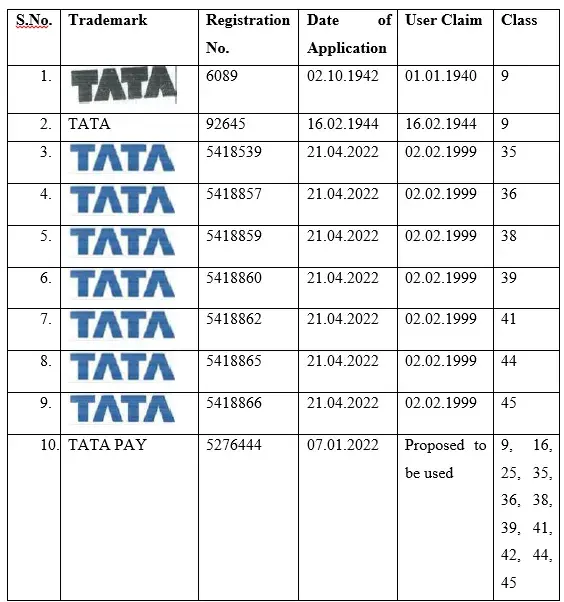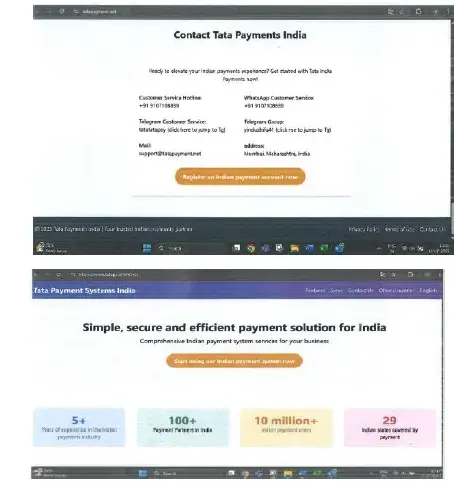By Rima Majumdar and Aashi Nema
Introduction
The Hon’ble Delhi High Court has granted an ex-parte ad interim injunction on August 11, 2025 in favour of Tata Sons and its digital payments subsidiary, Tata Payments (Plaintiffs) against the unauthorized use of their trademarks “TATA” and “TATA PAYMENTS.” This case illustrates the risks of domain name misuse in the financial technology sector and highlights the judiciary’s proactive role in preventing consumer deception in the digital payments ecosystem.
Facts of the Case
- About Plaintiff
- Tata Sons Pvt. Ltd. (Plaintiff No.1) was incorporated in the year 1917 and Tata Payments Ltd. (Plaintiff No.2) is the financial services arm of the Plaintiff’s group. Plaintiffs approached the court alleging trademark infringement, passing off, and fraudulent activities by unknown Defendants operating the website tatapayment.net and multiple Telegram channels/groups.
- The Plaintiff is the owner and proprietor of various intellectual properties such as trademarks and domain names, details of which are enumerated below:
- Plaintiff No. 1 holds trademark registrations for its “TATA” formative marks, dating back to 1942, building a portfolio of over 1,496 trademark registrations. A few of the trademark registrations are as follows:
- Plaintiff No. 2 holds an RBI Payment Aggregator license since 01.01.2024 in order to facilitate e-commerce transactions and act as a merchant payment service provider. It is a RBI licensed Prepaid Payment Instrument issuer.
- The Plaintiffs also maintain more than 2,000 domains incorporating “TATA” with the earliest domain name registration dating back to October 15, 1996, for tata.com. The domain names also include www.tatapayments.com, registered in 2019.
- Defendant’s Activities
- In July 2025, the Plaintiffs discovered the infringing domain tatapayment.net, offering unauthorized digital payment services under the “TATA” and “TATA PAYMENTS” name. A few snapshots are pasted below:
- The site also listed inactive contact numbers and email IDs linked to tatapayment.net, along with Telegram accounts such as “tatatatapay,” “tatapaytech,”, “tatabusiness_bot.” etc. These groups and channels, containing Chinese text, appeared to facilitate overseas payment systems under the name “TATA Payment System for Rent.” A few snapshots are pasted below:
PLAINTIFF’S ARGUMENTS
The Plaintiffs argued that the Defendant’s conduct was a deliberate attempt to:
- Deceive and confuse consumers into believing authorization, association and affiliation with Tata Payments.
- Misappropriate goodwill and reputation of a century-old Indian brand.
- Enable fraudulent transactions using the Tata name.
COURT’S OBSERVATIONS AND ORDER
Hon’ble Mr. Justice Tejas Karia held that a prima facie case of infringement was made out for grant of an ex-parte ad-interim injunction. The balance of convenience favored the Plaintiffs, and irreparable harm would result to the Plaintiffs without immediate relief.
Accordingly, the Hon’ble Delhi High Court passed an ex-parte ad-interim injunction order, thereby:
- Defendants were retrained from using the marks “TATA” or “TATA PAYMENTS” or any deceptively similar variations thereof.
- The Defendant No. 2 i.e., Cloudflare Inc. was directed to block and suspend registration of the infringing domain and disclose registrant details, including KYC and IP addresses.
- The Defendant No. 3 i.e., Telegram was ordered to temporarily block infringing accounts and furnish details in a sealed cover/password protected document.
- If new fraudulent groups emerge on Telegram, Tata may directly notify the platform for removal without seeking further court intervention.
AUTHOR’S NOTE
As digital payment systems expand, fraudulent entities increasingly attempt to exploit trusted legacy brands to defraud consumers. This case is a significant precedent that highlights the intersection of intellectual property, fintech regulations and digital consumer protection. In an age where online scams are increasingly carried out through fake websites and massaging apps, this order showcases the proactive steps taken by judiciary in addressing online impersonation and fraud involving infringing domain names and trademarks. With India’s growing digital economy, companies must strengthen their domain name monitoring and enforcement strategies. This includes collaboration with intermediaries to safeguard their brand equity and consumer trust.
Ayushi Dhari Singh, Assessment Intern at S.S.Rana & Co. has assisted in the research of this article.





